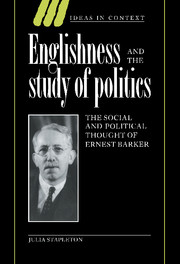Book contents
- Frontmatter
- Contents
- Acknowledgements
- Introduction: The ‘national character’ of Barker's thought
- 1 Lancashire, Idealism, and Whiggism: the making of an English political scientist
- 2 The polis, law, and the development of political studies at Oxford, 1900–1920
- 3 Society and the state in the English national past: the lure of Pluralism
- 4 Statehood, nationhood, and internationalism: English political theory and the First World War
- 5 Education and national character: the milieu of King's College London
- 6 ‘Continental’ political science and the Cambridge Chair
- 7 Traditions of civility: the construction of Englishness in the Second World War and beyond
- 8 The expansion of Englishness: the Books Commission, Europe, and the Commonwealth
- Conclusion: A late-Victorian liberal-conservative
- Select Bibliography
- Index
- Ideas in Context
Conclusion: A late-Victorian liberal-conservative
Published online by Cambridge University Press: 11 September 2009
- Frontmatter
- Contents
- Acknowledgements
- Introduction: The ‘national character’ of Barker's thought
- 1 Lancashire, Idealism, and Whiggism: the making of an English political scientist
- 2 The polis, law, and the development of political studies at Oxford, 1900–1920
- 3 Society and the state in the English national past: the lure of Pluralism
- 4 Statehood, nationhood, and internationalism: English political theory and the First World War
- 5 Education and national character: the milieu of King's College London
- 6 ‘Continental’ political science and the Cambridge Chair
- 7 Traditions of civility: the construction of Englishness in the Second World War and beyond
- 8 The expansion of Englishness: the Books Commission, Europe, and the Commonwealth
- Conclusion: A late-Victorian liberal-conservative
- Select Bibliography
- Index
- Ideas in Context
Summary
THE HOSTILITY OF POSTERITY
On the twenty-fifth anniversary of the Political Studies Association (PSA) in 1975, Wilfred Harrison found it necessary to explain to younger members of the profession why articles by Ernest Barker and G.D.H. Cole had been included in the first edition of Political Studies (1953). ‘Odd’ though those pieces now seemed, Harrison stressed that at the time Barker and Cole had been two ‘leading scholars’. Moreover, for those who required further retrospective justification, he added that references had been made to the two authors in recent works of political theory, this being evidence of sustained interest in their writings.
Nevertheless, that attention notwithstanding, Harrison's almost apologetic statement emphasises the semi-obscurity into which Barker quickly plunged not long after his death on 17 February 1960. Until a decade or so previously, he could still count on an audience who upheld the political importance of liberal internationalism, individual freedom, reason, and conciliating class differences. If only among the survivors of his own generation, he could also assume continuing support for the view that the political philosophy and practice of the ancient world contained many valuable lessons for contemporary society. But the liberal underpinnings of these beliefs gave way quite dramatically after the Second World War as Green, Mazzini, and other Victorian prophets of spiritual betterment lost much of their remaining authority.
- Type
- Chapter
- Information
- Englishness and the Study of PoliticsThe Social and Political Thought of Ernest Barker, pp. 198 - 221Publisher: Cambridge University PressPrint publication year: 1994
- 1
- Cited by



